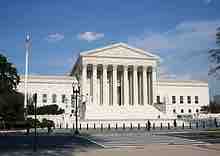The ability of individuals, groups, and corporations to lobby the government is protected by the right to petition in the First Amendment. It is protected by the Constitution as free speech; one accounting was that there were three Constitutional provisions which protect the freedom of interest groups to "present their causes to government", and various decisions by the Supreme Court have upheld these freedoms over the course of two centuries . Corporations have been considered in some court decisions to have many of the same rights as citizens, including their right to lobby officials for what they want. As a result, the legality of lobbying took "strong and early root" in the new republic.
Value or Price
In 1953, after a lawsuit involving a congressional resolution authorizing a committee to investigate "all lobbying activities intended to influence, encourage, promote, or retard legislation," the Supreme Court narrowly construed "lobbying activities" to mean only "direct" lobbying–which the Court described as "representations made directly to the Congress, its members, or its committees". It contrasted it with indirect lobbying: efforts to influence Congress indirectly by trying to change public opinion. The Court rejected a broader interpretation of "lobbying" out of First Amendment concerns, and thereby affirmed the earlier decision of the appeals court. The Supreme Court ruling was:
In support of the power of Congress it is argued that lobbying is within the regulatory power of Congress, that influence upon public opinion is indirect lobbying, since public opinion affects legislation; and that therefore attempts to influence public opinion are subject to regulation by the Congress. Lobbying, properly defined, is subject to control by Congress, . . . But the term cannot be expanded by mere definition so as to include forbidden subjects. Neither semantics nor syllogisms can break down the barrier which protects the freedom of people to attempt to influence other people by books and other public writings. . . . It is said that lobbying itself is an evil and a danger. We agree that lobbying by personal contact may be an evil and a potential danger to the best in legislative processes. It is said that indirect lobbying by the pressure of public opinion on the Congress is an evil and a danger. That is not an evil; it is a good, the healthy essence of the democratic process. . . .—Supreme Court decision in Rumely v. United States

Using the Courts
Drawing on the First Amendment, the U.S. Supreme Court has protected lobbying as free speech in numerous rulings since the early republic.